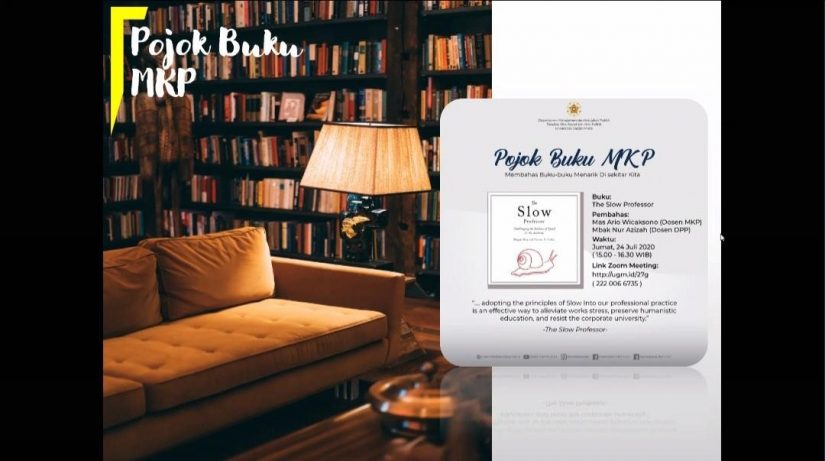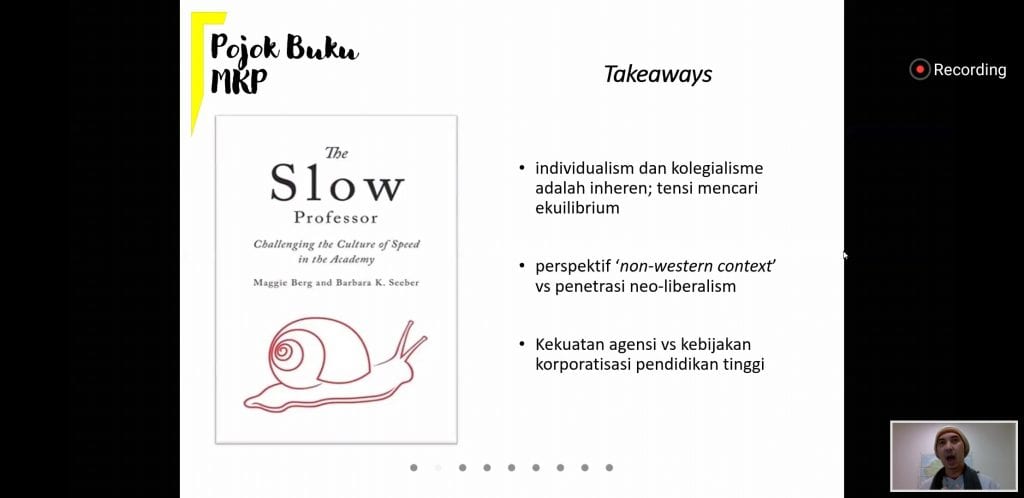
Yogyakarta, July 24th 2020 – Telephone conference usage in this pandemic time was inevitable. People got used to move from one online meeting to another. This activity affected their time allocation for their hobbies, including reading. Because of that, Department of Public Policy Management tried to accommodate anyone to use teleconference or video as a way to exchange information about books in a discussion called MKP Book Corner. Not only limited to book review, but this forum also designed to discuss about journals, documentary films, even podcast from the point of view of public policy management.
In this first discussion, MKP Book Corner was presented its initiator, Ario Wicaksono, a lecturer of Department of Public Policy Management and was accompanied by Nur Azizah, a lecturer of Department of Politics and Government. Ario and Azizah discussed about a book titled as ‘The Slow Professor’, a book which talked about the demands faced by academics and the importance of slow movement. Because the topic was closed to the condition of both speakers, Ario and Azizah also shared their experiences in responding to the ideas of this snail’s picture bound book.

In reality, academics demanded to move from one task to another, such as fulfilled the three points of Tridharma Perguruan Tinggi, and also administrative and structural works. And not only in Indonesia, it also happened in the country of this book writer. This condition made academics stress. Ario showed a research result that he found regarding job satisfaction with stress among academics.
Unfortunately, mental health issues among academics was a laten problem—many of them did not realize that this was an important issue. This point of view arose because of the stigma that academics were rational people. The demands to be rational all the time then suppressed the mental health condition of academics. This book offered a solution for this problem, it was applied the slow movement for academics.
This slow movement idea arose from mindfulness. Slow movement was a way of an individual—in this context, academics—to not to do something in a hurry and applied cultivating emotional and intellectual resilience. Azizah added that the key of slow movement was flexibility, how academics see and take an opportunity. Do not let this slow movement hinder the development of academics.
The next three chapters of this book—chapter two to chapter four—gave a practical ways to practice slow movement for academics, either it was for researching, learning process, even networking.
Ario said that the mental health condition of academics also affected the learning quality process. So, the application of slow movement for academics could make students happier.
But, according to Ario, there were some points of this book that need to be criticized, related to the focus of this book which more focused on the strength of agencies and individual academics, but tend to forget the universities corporatization. Universities corporatization could also be understood by the condition of our education which consisted of certain standards and it actually made academics did not have their freedom. “When we were in a system that suppressed us, sometimes we do not have other choices other than follow it,” Azizah added.
The discussion went well and exciting because many academics from various universities in Indonesia also joined this. Many of them responded to the topics from this book, but many of them also shared their experiences as an academics. Occasionally, several participants asked about the views of Ario and Azizah regarding the issues in the book.
In the future, MKP Book Corner Discussion would be held every two weeks. For anyone who interested in giving their ideas regarding a book, they could contact Ario or find the informations on the official account of Department of Public Policy Management.
